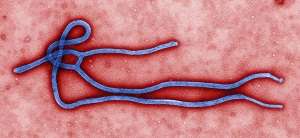 |
| Ebola virus under an electron microscope--Courtesy of CDC |
The U.S. National Institutes of Health is set to begin an early-stage clinical trial for an Ebola vaccine as early as September, according to the agency.
Though not the first human vaccine trial for the virus, which causes severe hemorrhagic fever and historically has killed up to 90% of its victims, the study comes after mounting pressure from health organizations like Médecins Sans Frontières and the U.K.'s Wellcome Trust to allow experimental treatments to be used on people at high risk of developing the disease.
The vaccine, developed by the National Institute of Allergy and Infectious Diseases' (NIAID) Vaccine Research Center, contains no infectious Ebola virus material. Instead, it is a chimpanzee adenovirus vector vaccine comprising an insert of two Ebola genes. Adenovirus vectors are attractive delivery models for vaccine candidates because the virus can be easily manipulated. As a nonreplicating viral vector, the vaccine works by entering a cell and delivering the new genetic material. The new gene inserts cause a protein to become expressed, which in turn elicits an immune response in the body. The NIAID said the vaccine has recently shown promise in a primate model.
"The VRC vaccine will enter into a Phase I clinical trial, which could start enrollment as early as fall 2014, pending approval by the FDA. The VRC is in discussions with governmental and nongovernmental partners regarding options for advancing this candidate beyond Phase I clinical evaluation," an NIAID spokesperson told FierceVaccines.
The arrival of two Ebola patients at Emory University in Atlanta in the next several days has already sparked concerns that the disease could spread to the U.S., heightening the need for a vaccine. But health officials have said that scenario is unlikely.
The NIAID has been working for years to develop a vaccine against the lethal disease and conducted its first trial in 2003. Since then, separate research teams have carried out three other Phase I trials in 2006, 2007 and 2012, according to ClinicalTrials.gov. One of the biggest challenges to studying a vaccine in patients is the relative rarity of the disease. Outbreaks of Ebola have so far been limited to Africa but have been increasing in frequency since the discovery of the virus in 1976.
Currently, Inovio Pharmaceuticals ($INO) and Vaxart are testing Ebola vaccines in animals, and last year GlaxoSmithKline ($GSK) acquired Swiss biotech Okairos, which has an Ebola vaccine in the preclinical phase.
In a July 31 update, the World Health Organization estimates that the Ebola virus has caused 1,323 cases of the disease and 729 deaths--a mortality rate of 55%.